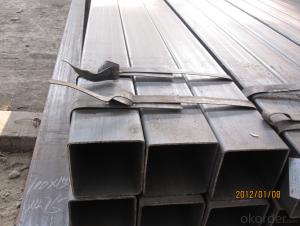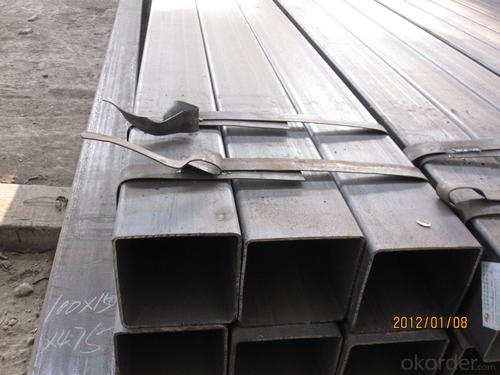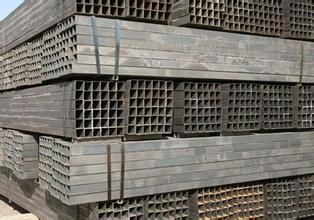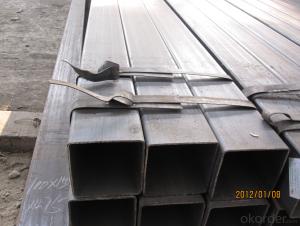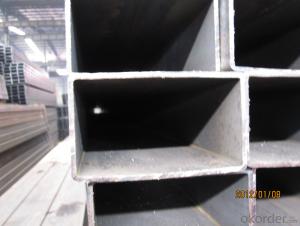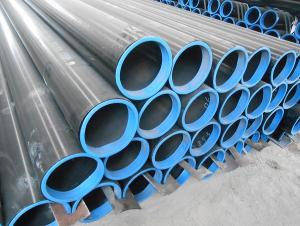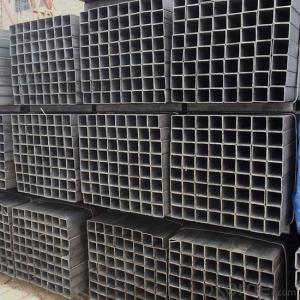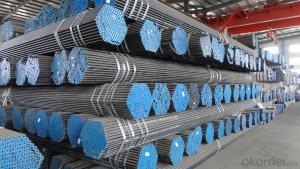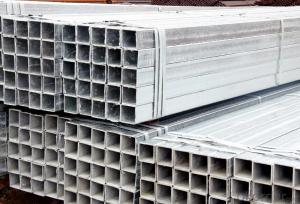Rectangular Hot Rolled Steel Pipe With High Quality
- Loading Port:
- China main port
- Payment Terms:
- TT or LC
- Min Order Qty:
- 100 m.t.
- Supply Capability:
- 10000 m.t./month
OKorder Service Pledge
OKorder Financial Service
You Might Also Like
1.Quick Details
Thickness: | 1.0 - 35 mm | Section Shape: | Square | Outer Diameter: | 20*20-600*600 |
Place of Origin: | Shandong China (Mainland) | Secondary Or Not: | Non-secondary | Application: | Structure Pipe |
Technique: | Cold Rolled | Certification: | CE | Surface Treatment: | oil,paint |
Special Pipe: | Thick Wall Pipe | Alloy Or Not: | Non-alloy | Name: | Square Hollow Steel Pipe/Tube |
Shape: | Square/Rectangular | Yield Strength: | 360-380Mpa | Tensile Strength: | 560-580Mpa |
Elongation: | 24-28% | Bend Test: | Qualified | Impact Value: | V-notch |
Grade: | 20#,45#,16Mn,A210,St45,Q235,Q345,Q195,Q215,10#-45#,A53-A369,ST35-ST52,Q195-Q345 | Standard: | JIS G3465-2006,JIS G3466,GB/T 3094 |
2.Specifications
1. OD:15X15-800X800MM,20X30--600X800MM
2. Thick.:1.0--35.0MM
3.FAQ of Rectangular Steel Tube
①How is the quality of your products?
Our products are manufactured strictly according to national and internaional standard, and we take a test
on every pipe before delivered out.
②How about price?
Yes, we are factory and be able to give you lowest price below market one, and we have a policy that “ for saving time and absolutely honest business attitude, we quote as lowest as possible for any customer, and discount can be given according to quantity”,if you like bargain and factory price is not low enough as you think, just don’t waste your time.Please trust the quotation we would give you, it is professional one.
1.Quick Details
Thickness: | 1.0 - 35 mm | Section Shape: | Square | Outer Diameter: | 20*20-600*600 |
Place of Origin: | Shandong China (Mainland) | Secondary Or Not: | Non-secondary | Application: | Structure Pipe |
Technique: | Cold Rolled | Certification: | CE | Surface Treatment: | oil,paint |
Special Pipe: | Thick Wall Pipe | Alloy Or Not: | Non-alloy | Name: | Square Hollow Steel Pipe/Tube |
Shape: | Square/Rectangular | Yield Strength: | 360-380Mpa | Tensile Strength: | 560-580Mpa |
Elongation: | 24-28% | Bend Test: | Qualified | Impact Value: | V-notch |
Grade: | 20#,45#,16Mn,A210,St45,Q235,Q345,Q195,Q215,10#-45#,A53-A369,ST35-ST52,Q195-Q345 | Standard: | JIS G3465-2006,JIS G3466,GB/T 3094 |
2.Specifications
1. OD:15X15-800X800MM,20X30--600X800MM
2. Thick.:1.0--35.0MM
3.FAQ of Rectangular Steel Tube
①How is the quality of your products?
Our products are manufactured strictly according to national and internaional standard, and we take a test
on every pipe before delivered out. If you want see our quality certifications and all kinds of testing report, please just ask us for it.
②How about price?
We have a policy that “ for saving time and absolutely honest business attitude, we quote as lowest as possible for any customer, and discount can be given according to quantity”,if you like bargain and factory price is not low enough as you think, just don’t waste your time.Please trust the quotation we would give you, it is professional one.Guaranteed: If products’ quality don’t accord to discription as we give or the promise before you place order, we promise 100% refund.
③Why should you chose us?
Our service formula: good quality+good price+good service=customer’s trust
SGS test is available, customer inspection before shipping is welcome, third party inspection is no problem.
If you have any question, pls feel free to contact us !
4.Rectangular Hot Rolled Steel Tube Image
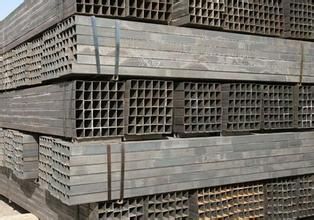
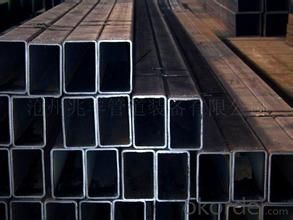
- Q: What are the different types of steel pipe fittings for industrial applications?
- There are several types of steel pipe fittings commonly used in industrial applications, including elbows, tees, reducers, couplings, flanges, and unions. These fittings are designed to connect and redirect the flow of fluids or gases within a piping system, ensuring proper functionality and efficiency in various industrial processes.
- Q: Who knows what is the difference between double submerged arc welded pipe and longitudinal submerged arc welding?
- The straight seam welding is relative to the spiral welding and the T-shaped welding, and so on.
- Q: How are steel pipes used in hydroelectric power plants?
- Steel pipes are used in hydroelectric power plants to transport water from the reservoir to the turbines. These pipes are designed to withstand high pressure and are often used for penstocks, which are large vertical pipes that deliver water to the turbines at a controlled rate. The durability and strength of steel pipes make them ideal for withstanding the force of the flowing water and ensuring a reliable water supply for power generation.
- Q: Can steel pipes be used for underwater applications?
- Yes, steel pipes can be used for underwater applications as they are known for their high strength, durability, and corrosion resistance, making them suitable for various underwater environments and industries such as offshore oil and gas, marine construction, and underwater pipelines.
- Q: How are steel pipes used in the wastewater treatment industry?
- Steel pipes are commonly used in the wastewater treatment industry for various purposes, including the transportation of wastewater from one area to another, the distribution of treated water to different locations, and the construction of infrastructure such as pumping stations and treatment plants. Due to their durability, resistance to corrosion, and ability to withstand high pressure, steel pipes are essential components in the efficient and reliable operation of wastewater treatment systems.
- Q: How are steel pipes classified based on their end connections?
- Steel pipes can be classified based on their end connections into three main categories: threaded, flanged, and welded. Threaded pipes have screw threads on the ends, allowing for easy assembly and disassembly. Flanged pipes have flanges on the ends, which are flat surfaces that can be bolted together, providing a strong connection. Welded pipes have their ends welded together, creating a permanent and secure joint.
- Q: What's wrong with the 3PP anticorrosive steel tube?
- PP and PE are similar in processability, and the 3PE coating can be used to produce 3PP coatings without the need for a special 3PP coating line. However, the difference between PP and PE materials makes the 3PP and 3PE coatings show different properties, which can be applied to different environments. The advantages of 3PP coating on some properties make it possible to play an important role in the field of 3PE coating. Therefore, many foreign pipeline projects use 3PP anticorrosive coating.
- Q: What are the different types of steel pipe supports for seismic applications?
- There are several types of steel pipe supports used for seismic applications, including rigid supports, sway braces, and spring hangers. Rigid supports provide fixed support to the piping system, while sway braces are designed to absorb and redirect seismic energy. Spring hangers, on the other hand, are used to isolate and dampen vibrations caused by seismic activity. These different types of supports are selected based on the specific requirements and characteristics of the piping system and the seismic zone in which it is located.
- Q: What is a tight steel tube?
- The tight steel tube is called "galvanized steel pipe with sleeve connection" or "flat pipe of steel metal for electrical installation". JDG. The utility model relates to a novel protective conduit for an electric circuit. The connecting sleeve and the metal accessory are provided with a wire pipeline composed of screw fastening connection technology, and the utility model does not need to do cross grounding, welding and covering, and the appearance is silvery white or yellow.
- Q: How are steel pipes used in the construction of sewer systems?
- Steel pipes are commonly used in the construction of sewer systems due to their durability and strength. They are used to transport wastewater and sewage from buildings to treatment plants or disposal sites. Steel pipes are resistant to corrosion and can withstand high pressure, making them ideal for underground applications. Additionally, their smooth interior prevents clogs and blockages, ensuring efficient flow and preventing damage to the sewer system.
Send your message to us
Rectangular Hot Rolled Steel Pipe With High Quality
- Loading Port:
- China main port
- Payment Terms:
- TT or LC
- Min Order Qty:
- 100 m.t.
- Supply Capability:
- 10000 m.t./month
OKorder Service Pledge
OKorder Financial Service
Similar products
Hot products
Hot Searches
Related keywords
